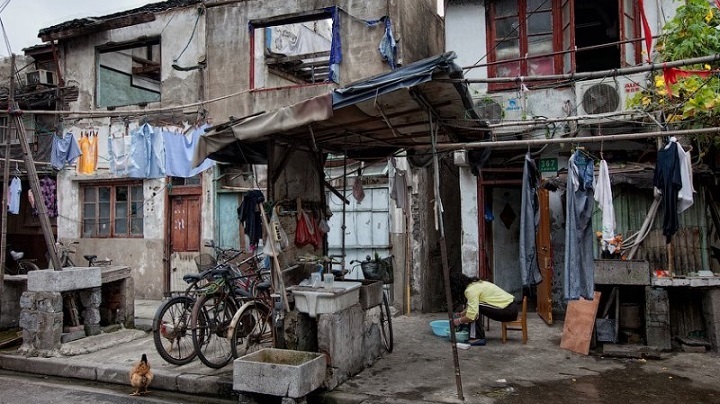
In February, China’s President Xi Jinping announced a large and bold plan for a nationwide basically all-encompassing welfare system, arguing it is a crucial issue for state stability “是治国安邦的大问题.” [1] It is a right assessment because if there is no social security there will be a potential army with nothing to lose that will feel cast out from the general prosperity and will destabilize the country.
Yet the announcement didn’t specify how all of this will be financed, especially since total state debt (central and local governments plus SOE, State Owned Enterprises debt) may well be more than four times China’s GDP.
How to pay?
Who will pay for a massive overhaul of the social security system then? The rich with more taxes? This will create domestic social political problems as it will break the social contract established after the 1989 Tiananmen crackdown.
That contract encouraged people to get rich without paying taxes provided they stayed out of politics. If now people have to pay taxes, they will be unhappy and at least they will want to see how their money is spent—after all, there is the old problem of “no taxation without representation” [2].
In old imperial times, the issue was solved brutally: the rich bribed the officials and didn’t pay taxes, which were paid by the poor. This periodically in each dynasty created a double crunch. The state gradually had a financial shortage, as the poor couldn’t cough up enough money and the poor hated and felt cornered by the rich and corrupt officials, and thus they rebelled. The new dynasty redistributed land at the beginning and then someone became richer while others were poor and the cycle started again.
Now Xi wants the new welfare system to take care of the less fortunate, but still if the rich have to pay and have nothing to say, their dynamism, which drove China’s growth in the past four decades, could tumble and eventually economic growth would sputter.
Another way would be to go for more trade surplus, i.e. have the world pay for China’s welfare system. This will exacerbate existing frictions with the US and other countries already annoyed by China’s surplus and by what they see as currency manipulation. They argue in fact that China keeps its currency exchange rate artificially low to boost exports.
Something else to look into would be to tap into a larger spread between interest on deposits and interests on loans. This will de facto further tax middle class savings. The middle class is the backbone of Chinese society, but if it feels deprived of a just reward on its savings, it may look for other riskier investment vehicles, and if they lose their money, they will be unhappy—or will just try to keep their stash out of the banking system.
Another strategy, skirting the above problems, could be to boost internal growth. The next plenary session of the Chinese parliament, the National People’s Congress (NPC) due to open on March 5, is expected to include an announcement floating non-agricultural land in the market and urbanizing some 25% of the population. This would mean that rural houses, which so far could not be freely bought and sold, could be brought to the market.
The floating of these assets and the urbanization of some 3-400 million people could drive economic growth for a decade, but could also create immediate social problems. The money for the sale of the rural houses of the newly urbanized ex-farmers could be wasted overnight, and it will not be easy to guarantee full employment for hundreds of millions who could then become an angry, dissatisfied urban proletariat. Internal social security using A.I. (Artificial Intelligence) can keep tabs on them something that people could accept but not make them happy. Anyway, all of this could be manageable if China had a positive international environment. But if it doesn’t, all becomes far more complicated.
The NPC also promises SOEs reforms, with private capital investment and greater freedom in exchanging capital accounts. These are all moves in the right direction but they have been attempted in the past and failed to bear huge fruits as they only dent the underlying problems. Private entrepreneurs are loath to invest in SOEs, as it puts their money under state control, it doesn’t buy them state assets, and greater freedom in exchange is not a free exchange of the RMB, which would burst the bubble of a system with a massive and chaotically recorded debt-to-GDP ratio (more than four times, as we said). This all happens when taxing incomes is a great difficulty, according to the finance minister.[3]
Viewing Party Congress
These measures can help China to buy time and move the country to a triumphal 2022 party congress.
In the meantime, the US is trying to assemble an alliance of democracies and technologically advanced countries that excludes China and creates a basic backbone for the new Cold War. In this alliance, technology, military, ideology, strategy, and geopolitical concerns will be aligned following a common paramount worry—China’s cumbersome and inattentive growth that stumbles and trudges on legitimate interests of the world and of its people.
It won’t be easy for China to present the party congress next year in this atmosphere. In 2007[4] there were concerns of a crisis around the 2022 party congress and recommendations for democratic reforms well before that time to preempt the crisis. China however after 2008 felt democracy was unreliable and shelved the idea of democracy. Some 15 years ago, even modest democratic reforms would suffice to buoy the country, given the overall global support for China.
Presently, China would need not only democratic reforms but also a redefinition of its political and strategic ambitions vis-à-vis its neighbors. That is, China would need to concede political reforms and territory in exchange for peace and development. But Beijing may feel it doesn’t need that as its system emerged from the Covid crisis stronger than ever and it expects 8% GDP growth for 2021. Moreover, it conversely sees its main adversary, the US, confused and fumbling around. All in all, this is a recipe for war.
[1] http://paper.people.com.cn/rmrb/html/2021-02/28/nw.D110000renmrb_20210228_1-01.htm
[2] See my 2007 China’s Inevitables: Death, taxes—and democracy in https://www.amazon.it/China-name-law-global-order/dp/8867974904
[3] https://www.scmp.com/economy/china-economy/article/3123484/chinas-fiscal-risks-extremely-severe-former-finance-minister
[4] See China’s Inevitables… op. cit.






China could easily afford these costs if the government wasn’t spending such a huge sum on social control. And it is already using regressive taxes to finance much of the state budget. Why not actually use progressive taxation of wealth to redress obscene social inequality? The rich have no way to object anyway.
Una guerra tra Cina e USA sarebbe la fine della specie umana. E’ auspicabile e sperabile che i rispettivi governi ne siano consapevoli.